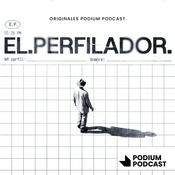25 episodios
- What did Susie, Sean's girlfriend at the time of Marlyne Johnson's murder, tell detectives? Was a $10,000 stash of cash ever found in the Johnsons' home? Did Sophia have an alibi?
These are just a few of the many questions listeners sent to the Beyond All Repair team. In this follow-up episode, Amory is joined by Beyond All Repair producer Sofie Kodner to answer these questions and more about the case, the story, and the making of the series.
***
Come to our live event, Thursday, June 20th!
Go behind the scenes with Amory and editor Zac Stuart-Pontier at WBUR CitySpace in Boston. Tickets and more info HERE.
***
Get access to the "BEYOND" episodes:
This show is made at WBUR, a public radio station, which means we cannot make shows like this without public support. Join our "BEYOND" membership program and receive extra episodes (there are 3 "BEYOND" episodes already waiting for you!) and a private feed of the show for ad-free listening: wbur.org/beyond - Amory talks to Shane about the 2010 report, along with the detective who wrote it and Rick Buckner, the lead detective on Sophia’s case 20 years ago.
She explores what can legally happen from here, both with regards to Marlyne Johnson’s homicide case and with Sophia herself.
Amory finally confronts Sophia about the 2010 report, and comes to a conclusion about the case.
***
Consider becoming a "BEYOND" member today:
This show is made at WBUR, a public radio station, which means we cannot make shows like this without public support. Join our "BEYOND" membership program and receive extra episodes and a private feed of the show for ad-free listening: wbur.org/beyond
***
Come to our live event, Thursday, June 20th!
Go behind the scenes with Amory and editor Zac Stuart-Pontier at WBUR CitySpace in Boston. Tickets and more info HERE. - After Sean’s conversation with Amory, he and his younger brother, Shane, talk to each other for the first time in two decades. Shane is open to hearing his brother out, until Sean denies a painful memory from their childhood.
Their father, who has always defended Sean, starts sending aggressive voice messages to Sophia and Shane. Meanwhile, Amory has even more questions for Sophia just as Shane is coming to his own conclusion that she did not commit the murder.
But shortly thereafter, Amory receives a report of an interview Sophia did with detectives in 2010 that tells yet another story of the day of Marlyne’s murder. Amory is left shaken and wondering if she actually has been talking to a murderer all this time.
***
Consider becoming a "BEYOND" member today:
This show is made at WBUR, a public radio station, which means we cannot make shows like this without public support. Join our "BEYOND" membership program and receive early access to some of the final episodes in the series, extra episodes, and a private feed of the show for ad-free listening: wbur.org/beyond - After disappearing before he was supposed to testify in Sophia's second trial, Sean reappears in Guyana under the name Anthony Snow.
He has since launched various ventures, including a short-lived campaign for president of Guyana in 2011, a land development business that’s been the source of allegations of fraud, and a robust social media presence.
Sophia and Sean hadn’t seen each other or spoken in 17 years when he video-called her in early 2023 upon hearing that she’s been talking to a reporter.
Months after this call, Amory talks to Sean herself. He offers up a new detail about the day of Marlyne Johnson’s murder.
If you have questions about the case, the people at the center of this story, or anything else about this series, we want to hear them. Email [email protected] with a voice message or written message.
***
Consider becoming a "BEYOND" member today:
This show is made at WBUR, a public radio station, which means we cannot make shows like this without public support. Join our "BEYOND" membership program and receive early access to some of the final episodes in the series, extra episodes, and a private feed of the show for ad-free listening: wbur.org/beyond - Amory meets Sophia in person for the first time with a sense of uneasiness.
While in jail awaiting her second trial in 2005, Sophia made a friend who convinced her to testify in her own defense. Today, this friend, Morgen, is Sophia’s life partner.
After getting ahold of the footage of Sophia’s second trial, Morgen and Amory discover that Sophia told a different story about the day of the murder on the stand — one that puts her at the scene.
If you have questions about the case, the people at the center of this story, or anything else about this series, we want to hear them. Email [email protected] with a voice message or written message.
***
Consider becoming a "BEYOND" member today:
This show is made at WBUR, a public radio station, which means we cannot make shows like this without public support. Join our "BEYOND" membership program and receive early access to some of the final episodes in the series, extra episodes, and a private feed of the show for ad-free listening: wbur.org/beyond
Más podcasts de True crime
Podcasts a la moda de True crime
Acerca de Beyond All Repair
Home of Beyond All Repair, WBUR & ZSP Media's 10-part true crime investigative series and Violation, WBUR & The Marshall Project's series exploring America’s opaque parole system.
Sitio web del podcastEscucha Beyond All Repair, Historias de MundoCreepy y muchos más podcasts de todo el mundo con la aplicación de radio.net

Descarga la app gratuita: radio.net
- Añadir radios y podcasts a favoritos
- Transmisión por Wi-Fi y Bluetooth
- Carplay & Android Auto compatible
- Muchas otras funciones de la app
Descarga la app gratuita: radio.net
- Añadir radios y podcasts a favoritos
- Transmisión por Wi-Fi y Bluetooth
- Carplay & Android Auto compatible
- Muchas otras funciones de la app


Beyond All Repair
Escanea el código,
Descarga la app,
Escucha.
Descarga la app,
Escucha.








































